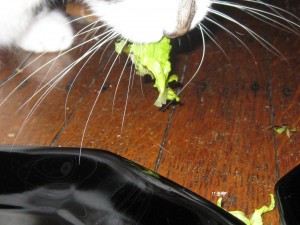 My cat Oscar has always had rather peculiar tastes for a feline. The smell of white beans has the same effect on him as catnip. In summer months, he answers to the nickname Tomato Slayer because of all the mornings we have woken to find heirlooms that have been rolled from a high shelf in the middle of the night and gruesomely mauled on the kitchen floor. If any sauce is left foolishly unattended on the stovetop, Oscar is sure to come slinking into the living room with a guilty little beard of it staining his white chin fur. And though all of these habits are exceedingly irritating, I won’t pretend that they don’t also fill me with a strange kind of pride: maybe my pet is special, a feline gastronome.
My cat Oscar has always had rather peculiar tastes for a feline. The smell of white beans has the same effect on him as catnip. In summer months, he answers to the nickname Tomato Slayer because of all the mornings we have woken to find heirlooms that have been rolled from a high shelf in the middle of the night and gruesomely mauled on the kitchen floor. If any sauce is left foolishly unattended on the stovetop, Oscar is sure to come slinking into the living room with a guilty little beard of it staining his white chin fur. And though all of these habits are exceedingly irritating, I won’t pretend that they don’t also fill me with a strange kind of pride: maybe my pet is special, a feline gastronome.
The boundaries of Oscar’s tastes have never been scientifically tested, however, and if my claims of his spectacular feline palate are to hold any water, they should be well documented. So I set up a little experiment with some salad greens to see if Oscar would demonstrate his omnivorous tendencies. Here are my scientific observations:
With red leaf lettuce, baby spinach and kale spread out before him, the subject headed straight for the kale. (The researcher initially attributed this to the fact that it was the only organic number in the bunch, but then discarded this hypothesis after remembering that the subject has been known to eat the puke of other cats. The kale was also closest to the subject.) He consumed several leaves quickly, before moving onto the spinach, eager to guard it from the other two cats in the room, even though they showed no interest.
The red leaf lettuce required a slightly different approach, with lots of vigorous head shaking (see Fig. 1). Presumably, curly leafed things are harder to kill. The subject then spent some time batting a kale leaf around the living room (Fig. 2), before consuming it. By the end of the approximately three minute trial, there was only a single chewed-upon spinach leaf and a kale leaf remaining (Fig. 3), from which we can conclude that either these two greens were less desirable than the lettuce or that the subject was interrupted by an itchy face which he proceeded to rub against a chair leg for several minutes.
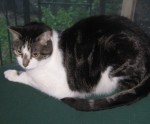
The subject exhibited no other negative aftereffects, aside from extreme drowsiness, which is typical. Results are inconclusive as to whether or not subject is gifted and should be sent to culinary school. Further testing may be necessary.

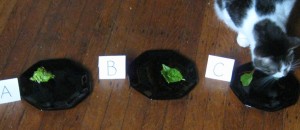
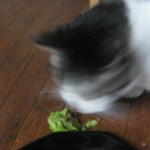
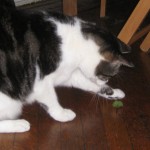
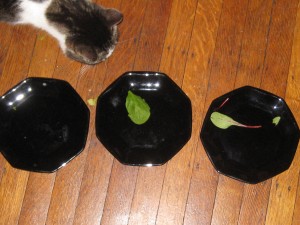
Hey, I want some kale, too. Meow.